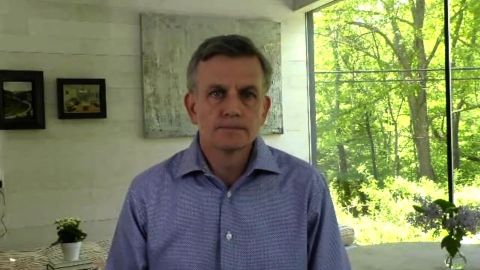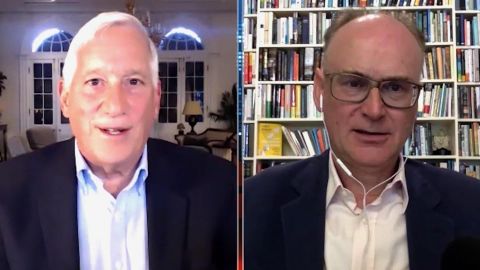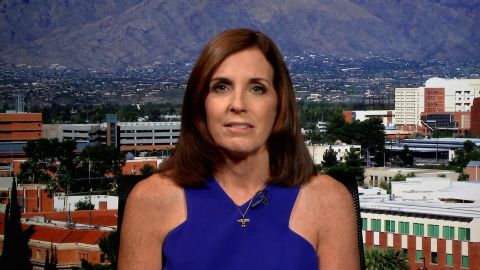Read Transcript EXPAND
CHRISTIANE AMANPOUR: And now the story of the global race for coronavirus vaccine is well-known by now. Our next guest, Matt Ridley is a British journalist. He’s a member of the House of Lords, and he’s a science writer whose books have sold over a million copies. His latest work, “How Innovation Works and Why It Flourishes in Freedom,” explores the most effective way of cultivating new and creative technologies in medicine and all sorts of other fields. Here’s our Walter Isaacson talking to Ridley about the fascinating history of innovation from Post-it notes to vaccinations.
(BEGIN VIDEOTAPE)
WALTER ISAACSON: Thanks, Christiane. And thank you, Matt Ridley. Welcome to the show.
MATT RIDLEY, AUTHOR, “HOW INNOVATION WORKS”: Great to be on the show with you, Walter. Thank you for having me.
ISAACSON: One of your things in your great new book, a book I loved, “How Innovation Works,” says that innovation doesn’t work when it’s imposed from the top down, when there’s too much top-down control and authority. Has it been a problem in the coronavirus crisis we’re facing?
RIDLEY: Yes, I think we have we are seeing a lack of innovation generally, the fact that we haven’t been able to speed up vaccine development. And, to some extent, we’re trying to force things like the tracing apps and other technologies to help us, rather than encouraging them to come from the sort of ferment of trial-and-error experiment that you have so rightly said in your books, in your book “The Innovators” in particular, is an important part of this story.
ISAACSON: But can we really afford trial and error when it comes to vaccine development?
RIDLEY: Well, that’s one of the problems, is that there are technologies, like nuclear power, like developing vaccines, where we can’t afford an error. And that tends to cut technologies off from the process by which they get refined and new processes get invented. What I think we need in the case of vaccines is a lot more platforms for how to develop vaccines faster. It’s all about trying to work out ways of speeding it up without making it less safe. And if you think right back to the origin of vaccination, which I write about in the book, in the 18th century, when the idea came in from the Ottoman Empire to Europe and America then, it was a very dangerous and weird idea, a huge opposition to it. And the woman who brought it to Britain was savaged, her reputation was, for trying this strange idea. So, there’s always been risk. In the early days of the polio vaccine, there were risky and dangerous things done that caused real harm. And yet we’re stuck with a situation where it takes a year, maybe two, to develop a vaccine, which is not that different from what it was 40 or 50 years ago.
ISAACSON: Tell us a little bit more about that story of Lady Mary Pierrepont, who is in your book.
RIDLEY: Yes, I love this story, because she’s a very feisty woman, a literary star. She was badly scarred by smallpox, and she lost her brother, and she was terrified that she was going to lose her children to smallpox. There were terrible epidemics at the time, the early 18th century. She went to Constantinople as the wife of the British ambassador there, and there, because she was a woman, she was able to mix with women in the Ottoman court who were practicing vaccination. Didn’t call it vaccination. They called it engrafting, and it is what we would call inoculation now, because they were actually giving smallpox to kids, but from people who had survived and in various ways doses. And this was a relatively effective way of saving lives. She came back to Britain. She persuaded everyone from the prince of Wales downward to give this a go, but not without a lot of difficulty. Something similar happened in the U.S. A slave brought the idea, from Africa, it seems, and Cotton Mather, the Boston preacher, passed it on to a doctor called Boylston. He ended up having to hide in a closet for 14 days to prevent the mob killing him for — because he vaccinated 300 people to save their lives. So it isn’t easy being an innovator.
ISAACSON: I remember that Ben Franklin was part of that controversy as a young guy, because his newspaper was against vaccinations. And then he lost a child to smallpox. And Ben Franklin turned around. It’s one of the things that happens with the scientific method, is, you let new evidence come in. How did you see that type of thing happening?
RIDLEY: Well, I think the arrival of new evidence often changes things. And it’s quite striking in the history of innovation how you start out in one direction, and then you end up going in a different direction. I’m very struck by the cases where people discovered things by accident. Kevlar, Teflon, a Post-it note are all examples of things that people discovered when they were looking for something else. Post-it notes, a very nice story, they were looking for a permanent glue that would work on paper. They found, instead, a temporary glue that worked on paper. And they thought, that’s useless. And then Art Fry said, hang on, this is just what I need for keeping my place in my hymn book during choir practice.
ISAACSON: You talk in your book about how innovation works. And you say that it’s sped up so much in the past 30 years, 80 years, except where it hasn’t sped up, whether it be air travel or vaccinations. Why in some areas has innovation not sped up at all?
RIDLEY: I think this is a very striking pattern. I’m struck by the fact that my grandparents lived through incredible changes in transportation. They were born before the motorcar and the airplane, and they died with men on the moon and supersonic planes in the air. I, on the other hand, have lived through a period with almost no changes in transportation. 747s are still flying. That’s a 50-year-old design of airplane. And there’s been no increase in speed of cars, trains or planes much in my lifetime. There’s been incredible improvements in safety, but not much change in speed. And yet I have lived through extraordinary changes in communication and computers, which my grandparents didn’t see. And they were born after the telephone and they died with the telephone. So, I think not all technologies go as fast at any one time. And I’m very intrigued by this. Part of it is regulation and government obstruction of innovation. So, for example, at the moment, the government has made it very easy to be an innovator in the digital world. It doesn’t take much in the way of permission or money to go out and set up and build a new Web site. It’s much harder to invent new drugs or new vaccines, enormous amount of regulatory problems. But there’s also physical limits. I mean, it seems like, in the case of transport speed, it just doesn’t make sense to burn as much fuel as you would need to do — to run a supersonic airliner. We tried for a while in the 1970s and eventually gave up. So, I think it’s a mixture of physical limits, where we hit a sort of diminishing returns issue, and the rules and regs that get in the way of innovation in one area are diverted into another area.
ISAACSON: Are there physical limits that curtail how fast we could do vaccinations against viruses?
RIDLEY: I think one of the big issues with developing new viruses is, of course, that you need to test them on healthy people, and those healthy people have to come in contact with the disease. And we’re already seeing, even in this epidemic, that we’re running out of examples where healthy people will bump into people with the disease. So, it’s getting harder to test the vaccine. And this happened with the Ebola vaccine, which was developed towards the end of the Ebola epidemic. And by the time it was developed, there just weren’t enough Ebola cases around for people to come into contact with them and find out whether or not it was safe, because, before that, you have got to test it on animals. You have got to test it on people to see that it’s safe. And then you can test to see whether it’s efficacious. These things take time. And it’s been hard to drive down that time quotient. I was taken by surprised by how much that hasn’t changed, as it were. I thought we had got faster at developing vaccines. But it turns out that it is — there are some irreducible problems here. I mean, I write in the book about the two women who developed the whooping cough vaccine in the 1930s in their spare time, an incredible story, really, and a beautiful story, and they never put a foot wrong, and they developed a safe and effective vaccine in about four years flat. We’d be pretty pleased if that was achieved today.
ISAACSON: You are a Tory member of the House of Lords. You have been a supporter of Boris Johnson. How do you assess his handling of this situation?
RIDLEY: Well, I think all of our political leaders are learning on the job and learning fast and learning how to rely or not rely on scientific evidence. I think the U.K. has made a series of mistakes. So have other countries. But compared with Germany, we made a huge mistake in not doing enough testing early, not ramping up the quantity of testing available. Korea, Germany, countries like that made that clear. And the U.S. made the same mistake that we did initially, which was to rely on the government labs to do all the testing and to see it as a centrally planned, centrally commanded, to keep the quality up, issue. But the U.S. did — then did a U-turn and said, no, we need the private sector to come in and help us here. And I think the one thing that the Johnson administration has not got right in the U.K. is recognizing that these are huge logistical challenges, how to do the testing, how to get the test results, et cetera, et cetera. And logistics is something that the private sector is very good at. I mean, if you look at the supermarkets, they have remained well-stocked throughout this period. If you look at Amazon, it’s delivering throughout this period. These people know how to do logistics. And I think we didn’t do enough learning from the private sector. We have tried to do too much of this within the public sector.
ISAACSON: You talk in your book about how to port cities, places with a lot of trade, a lot of diversity of people coming through, tend to be hubs of innovation. Even mentioned Fibonacci and sort of — and Renaissance Italy, where that was happening. Tell me about that. Why does that cause innovation to happen?
RIDLEY: Most innovation consists of combining existing technologies in different ways. It doesn’t consist of inventing a completely new technology out of nothing. And so that needs to happen through the cross-fertilization of ideas. These people need to come together and have one — bring a technology, bring an idea from one place and introduce it to another. Fibonacci is a is a merchant on the North Coast of Africa who learns mathematics the Arabian way, which is actually the Indian way originally, and he brings that whole system of the decimal system and then, very importantly, the idea that zero is a number, he brings that back to Italy, where it becomes a crucial part of the double entry bookkeeping system and eventually the commercial system of Italy and then the rest of Europe. So, it’s a lovely example of how being from Genoa and traveling to North Africa, you pick up ideas that you wouldn’t if you lived in a landlocked city, for example.
ISAACSON: When you talk about the importance of trade and immigration and port cities and people coming with ideas from all over, does that make you worry about the current global backlash against trade, against immigration, against globalization?
RIDLEY: Yes, I am worried about the current global backlash against trade and immigration. I think it is absolutely vital that we keep the benefits of globalization, the ability of an idea in Shanghai to meet an idea from San Francisco and have a baby idea in London, say. That’s the way the world has worked. And that’s the way the world will work. And we won’t escape this pandemic if we turn inward and become sort of autarkic and looking in on ourselves. Just take vaccination. The vaccine that cures this — or that prevents this disease is not going to be invented in every country. It’s going to be invented in one country, or maybe two or three. The people who don’t live in that country are going to need to know that they can get access to it. They’re going to be able to say, well, just because I don’t live in the country that invented the vaccine, that shouldn’t stop me from getting it. Well, it’s exactly the same with every other product. Why should we cut ourselves off from products and services available elsewhere? The one exception I have to trade being as free as possible is that I think it’s very important that trade is in healthy biological products and not unhealthy ones. So, the problem of bringing diseases across the ocean, not just human ones, but plant and animal diseases as well, is something we need to be very concerned about. And we need to restrict trade in wildlife and in biological systems to make sure that it’s safe.
ISAACSON: The essential theme of your great new book is that innovation requires freedom. If you had to throw in one ingredient, freedom would be that. Explain what you mean by that.
RIDLEY: Well, again and again, it — whether you’re looking about where it happened, when it happened, how it doesn’t happen as much in empires as in city states, and how it requires people to be free, innovation relies upon the freedom to experiment, to invest, to change your mind, to change direction. These are absolutely crucial ingredients that happen everywhere. And, if you look at big companies, which struggle to be innovative often — they — a bit like big empires, they become anti-innovation as they get bigger and more vested in their existing products. The way they solve that is by setting one group of thinkers free within a corner of the corporation. This is known as the skunkworks, after the Lockheed Skunk Works. Google has done this with its X Project. Other big company — and a Procter & Gamble tried a different approach. They turned outside the company and said, we’re going to harvest innovations from elsewhere. We’re not going to rely on our own R&D departments. So, being free to think freely is the one thing that you need, I think, to be good at innovation.
ISAACSON: We hear about China these days leaping ahead of the West on artificial intelligence, even leaping ahead of the West on cancer treatments using biotechnology. Do you think that China’s going to hit a bad speed bump because of the lack of lack of freedom ingrained in the system, or may they have a different way of doing it?
RIDLEY: This is a really interesting question, because there’s no question that China has hit the front of the race for innovation. It is innovating, not just by catching up with the West, but by doing things afresh for the first time. A lot of the consumer digital stuff that it’s doing is way ahead of what people are doing in the West. So — and the same is true in biotechnology and artificial intelligence, as you say. So, there’s no question that China has, while having a centralized communist regime, become a very innovative economy. How is that possible if freedom is important? Well, the answer seems to be that, below the level of politics, it is actually quite a free society. So, if — as long as you don’t annoy the Communist Party, you don’t have as many petty rules and regulations to worry about if you want to set up a new business trying to do — produce a new product in China. So, in that sense, there is freedom down in the undergrowth of the Chinese economy, even if not at the top of society. However, under the development of the regime more recently, it is clear that China is becoming a much more dirigiste and centralized place. And I feel that that will kill the goose that lays the golden eggs, or, rather, as you put it, that China will hit a speed bump at some point. I don’t see China being the leader of world innovation for a very long time, unless it does free up its politics and its culture, as well as its technology and business.
ISAACSON: Matt, it was good to see you again. And thank you for joining us.
RIDLEY: It’s been wonderful talking to you.
About This Episode EXPAND
Arizona Senator Martha McSally discusses the tough reelection battle she faces in November. Michael Bloomberg’s former presidential campaign manager Kevin Sheekey discusses the fight against the pandemic. Writer Matt Ridley tells Walter Isaacson about the fascinating history of innovation, from post-it notes to vaccines.
LEARN MORE


